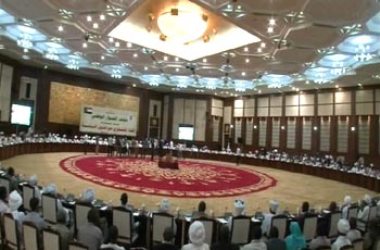Sudan’s new government to be announced next week: official
April 26, 2017 (KHARTOUM) – Sudanese Presidential Assistant Ibrahim Mahmoud Hamid Wednesday said the government of national concord will be announced next week pointing that two political hasn’t yet handed over lists of their candidates.

He stressed the current presidency, parliament speaker and states’ governors wouldn’t be impacted by the formation of the new government, denying that additional presidential advisors’ posts would be created.
“Consultations to form the government of national concord have been concluded, only two parties didn’t hand over the final list of their candidates…the government will most likely be announced next week … the Popular Congress Party (PCP) hasn’t submitted the list of its candidates but it will participate [in the government],” he said.
The presidential aide underscored the regional and international community support the national dialogue, saying there is no moral justification for taking up arms.
Hamed added that those who are hesitant to join the dialogue because they think their participation wouldn’t be effective should be assured that we seek to build a strong state and achieve political and security stability.
He added that all political forces are now convinced that the national dialogue is a true programme to achieve the democratic transformation, saying “he who doesn’t want to be part of the transformation won’t be forced to do so but he must oppose through peaceful means”.
Since January 2014, Sudan’s President Omer al-Bashir has been leading a national dialogue process whose stated aims are to resolve the armed conflicts, achieve political freedoms, alleviate poverty and the economic crisis, and address the national identity crisis.
Last October, the political forces participating in the national dialogue concluded the process by signing the National Document which includes the general features of a future constitution to be finalised by transitional institutions.
The opposition groups boycotted the process because the government didn’t agree on a humanitarian truce with the armed groups and due to its refusal to implement a number of confidence building measures aiming to create a conducive environment in the country before to hold the inclusive dialogue.
PEACE TALKS
Commenting on the peace talks, Hamid said there is no justification to not sign a peace deal in Darfur region, the South Kordofan and Blue Nile states.
He stressed the international community would stand against the chairman of the Sudan Liberation Movement (SLM-AW) Abdel-Wahid al-Nur if he refused to sign the peace agreement.
Al-Nur refuses to negotiate with the government since the failure of Abuja peace process in 2006. He says that the Sudanese authorities have to disarm militias, provide security for the displaced persons and civilians in Darfur and re-institute grabbed land.
Hamid described the demand of the Sudan People’s Liberation Movement/North (SPLM-N) to delay peace talks on the Two Areas as “flimsy excuse”, saying the rebel movement’s demand has everything to do with the deadline to lift the U.S. sanctions on Sudan.
“If the SPLM-N calls to not lift the sanctions on Sudan, it will be a shameful stance because the burden of these sanctions falls on the Sudanese people,” he said.
He said Washington didn’t buy the SPLM-N’s reason to delay the peace talks for two months.
South Kordofan and the neighbouring Blue Nile state, also known as the Two Areas have been the scene of violent conflict between the SPLM-N and Sudanese army since 2011.
Talks between the two sides for a cessation of hostilities and humanitarian access under the auspices of the African Union are stalled since last August.
The SPLM-N Monday announced they agreed with the African Union chief mediator Thabo Mbeki to postpone peace talks to next July and requested Washington to delay the permanent lifting of sanctions on Sudan for another six-month period.
RELATIONS WITH EGYPT
Meanwhile, the presidential aide has downplayed Cairo’s recent deportation of Sudanese journalists describing relations between the two countries as “strategic”.
On Monday night, the Egyptian authorities denied entry and deported journalist Iman Kamal al-Din from Al-Sudani newspaper just 24 hours after a similar move against journalist Al-Tahir Satti of Al-Intibaha daily.
He said that bilateral ties with Egypt “must be tackled away from pleasantries and emotions”, saying “we are keen to maintain good relations with all neighbouring countries and this requires significant effort”.
Hamid added Sudan’s strategy is developed so as to achieve “zero” problems with the neighbouring countries.
Tensions between Khartoum and Cairo have escalated following the former’s decision to restrict imports of Egyptian farming products which was reciprocated by Cairo’s decision to raise residency fees for Sudanese living in Egypt
.
Also, Sudan indicated that it would take some measures to end the Egyptian presence in the disputed area of Halayeb triangle after some Egyptian media outlets launched a campaign ridiculing Sudan’s cultural monuments.
(ST)
